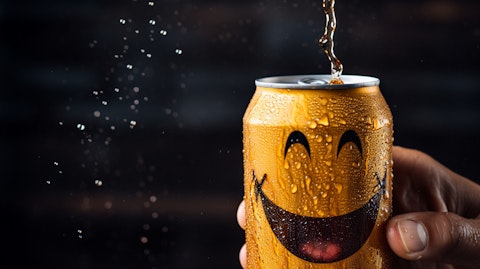In this article, we are going to discuss the best liquor stocks to buy according to short sellers.
Short selling is a strategy where traders profit from the decline in the price of a stock or other securities. It is when traders can borrow shares and sell them, hoping to purchase them back when they are cheaper. The strategy allows traders to capitalize on stocks or markets they feel are overvalued, giving them more opportunities to make a profit.
READ ALSO: 7 Best CBD Stocks to Invest In Right Now
Short sellers in America had a tough year in 2024, as the broader US market posted gains of over 23%, building on a gain of over 24% from 2023. The two-year uptick of 53% is the highest since the almost 66% rally in 1997 and 1998. As a result, short sellers were down $180.9 billion in last year’s mark-to-market losses, representing a decrease of approx. 15% on an average short interest of $1.2 trillion. The sectors where shorts performed the worst are, unsurprisingly, Information Technology and Communication Services, as tech stocks surged the most last year. However, the European market has recently been a popular playground for short sellers amid the region’s sluggish economic and earnings growth and political instability in France and Germany.
The alcohol sector also seems like an attractive option for short selling, especially after the recent advisory by the US Surgeon General Vivek Murthy that consuming alcohol increases the risk of at least seven types of cancer, including breast, colon, and liver cancer. The report claims that alcohol consumption in the US is directly linked to approximately 100,000 cancer cases and 20,000 deaths annually. As such, Mr. Murthy has proposed to put cancer warning labels on alcoholic beverages, signaling a shift toward more aggressive tobacco-style regulation for the sector if adopted. The Surgeon General also called to reassess the guidelines on alcohol consumption limits, so consumers can weigh the risks more accurately.
The advisory also managed to impact the financial market, sending down the stocks of several major alcohol players in the country, in some cases by over 3%. This comes at a time when the alcohol sector is already facing some major headwinds, including a downturn in sales following the pandemic boom, threats of looming tariffs, competition from alternative beverages, and the rapidly rising trend of abstinence. More and more Americans, especially the younger generations, are becoming increasingly conscious about health and wellness and saying ‘no’ to alcohol. According to the National Institute on Alcohol Abuse and Alcoholism, America’s per capita annual consumption of alcohol in 2022 was 2.5 gallons, down from 3.28 gallons in the early 1980s.
However, this shift has marked a new opportunity for the alcohol industry, which has responded by flooding the market with a wide range of low- and no-alcohol beverages. The strategy seems to be paying off, as according to Nielsen, non-alcoholic beer, wine, and spirits collectively surpassed $565 million in sales in 2023, up 35% from the year before.
There are also doubts over how effective putting warning labels on alcoholic beverages will be since ingrained habits are hard to change and similar labels have done little to curb smoking. Some experts remain optimistic. Paul Gilbert, an associate professor at the University of Iowa College of Public Health, believes that it is unlikely that people will immediately change their drinking habits following the Surgeon General’s report, but it could eventually lead to changes in how people perceive their risk.
With that said, here are the Best Alcohol Stocks to Invest in According to Short Sellers.

A hand pouring a cool can of a carbonated non-alcoholic beverage with a smiley face on it.
Methodology:
To collect data for this article, we looked up the 20 Largest Publicly Traded Liquor Companies in the US and then picked out the ones with the lowest short percentage. The stocks are sorted in descending order of their short interest, as of December 13, 2024. Following are the Best Alcohol Stocks According to Short Sellers.
At Insider Monkey we are obsessed with the stocks that hedge funds pile into. The reason is simple: our research has shown that we can outperform the market by imitating the top stock picks of the best hedge funds. Our quarterly newsletter’s strategy selects 14 small-cap and large-cap stocks every quarter and has returned 275% since May 2014, beating its benchmark by 150 percentage points (see more details here).
10. Molson Coors Beverage Company (NYSE:TAP)
Short % of Shares Outstanding: 4.4%
Molson Coors Beverage Company (NYSE:TAP) is a multinational beverage and brewing giant with a diverse portfolio that includes a variety of beer brands, spirits, and non-alcoholic beverages spread across the Americas, Europe, the Middle East, Africa, and Asia Pacific. With a 4.4% share of the global beer production, Molson Coors is the 5th-largest brewer in the world.
Molson Coors Beverage Company (NYSE:TAP) was among the companies that benefited the most from the infamous Bud Light controversy in 2023. The stock surged by over 16% between March 2023 and March 2024. However, those gains seem to be running out of steam. The brewing giant had a tough Q3 2024 as net sales declined 7.8% YoY to reach $3.04 billion, missing the analysts’ estimates by over $89 million. Its US financial volume also dropped by 17.9%, underscoring the vulnerability of the company’s market position. Analysts estimate that Molson Coors has lost approximately 48% of the market share gains it had previously secured due to the resurgence of competitor brands, such as Busch Light and Michelob Ultra.
That said, Molson Coors Beverage Company (NYSE:TAP)’s core brands remain healthy. According to Circana, in the US, Coors Light, Miller Lite, and Coors Banquet retained a substantial portion of their combined volume share gains in Q3 versus a year ago, when we saw strong share increases. In fact, in terms of volume percentage growth, its Coors Banquet brand is the fastest-growing top 15 beer brand in the US this year so far.
In response to the changing consumer preferences, Molson Coors Beverage Company (NYSE:TAP) is now strategizing to reshape its brand portfolio and focus on higher-margin segments. The company announced the divestiture of several of its craft beer brands, a move that aligns with its long-term strategy of emphasizing premiumization and expanding into the Beyond Beer segment.
Molson Coors Beverage Company (NYSE:TAP) maintains a strong balance sheet and generated $856 million in underlying free cash flow for the first nine months of 2024 while investing meaningfully in its business and returning $717 million in cash to shareholders through both dividends and share repurchases.
9. Brown-Forman Corporation (NYSE:BF-B)
Short % of Shares Outstanding: 3.76%
Brown-Forman Corporation (NYSE:BF-B) engages in the production and distribution of alcoholic beverages, with a special emphasis on spirits. This puts the company in a commanding position in the US, where spirits have continued to gain more and more market share over the last two years.
Brown-Forman Corporation (NYSE:BF-B) has been facing challenges in the post-Covid environment, with reported organic growth remaining flat or negative across its major categories. The spirits boom of the Covid lockdown has cooled down and a large number of the bottles that consumers had stocked up on are still sitting in their cabinets, leading to a weaker demand. Moreover, the rapid rise of ready-to-drink (RTD) and non-alcoholic offerings is also chipping away at the spirits’ market share.
That said, Brown-Forman Corporation (NYSE:BF-B) remains a leading operator in the spirits industry, with its premium brands positioned for long-term growth as global incomes rise and more people gain access to higher-quality alcohol. The company still has plenty of room for premiumization as several of its whiskey brands, like Woodford Reserve and Old Forester, still have untapped pricing power. Brown Forman’s highly popular tequila segment is also expected to gain from the excess supply of agave plants due to over-planting. This will bring down costs and increase margins.
Moreover, Brown-Forman Corporation (NYSE:BF-B) is also a proud member of the prestigious S&P 500 Dividend Aristocrats Index, having paid regular quarterly cash dividends for 81 consecutive years and even increased its regular dividend for 41 consecutive years. In November 2024, the company announced a 4% increase in its quarterly cash dividend to $0.2265 per share.
In addition to monetary profits, Brown-Forman Corporation (NYSE:BF-B) also remains committed to sustainability, focusing on reducing greenhouse gas emissions, protecting key watersheds, and ensuring 100% recyclable or reusable packaging. Last month, the company announced that it had also achieved its goal of engaging 100% of direct farmers on regenerative agricultural practices ahead of the 2025 deadline. Moreover, Brown-Forman has also recently introduced a 100% recycled bottle for the Woodford Reserve Distiller’s Select 50ml format, launched in global travel retail in December. The move is projected to reduce greenhouse gas emissions from the primary package by 30% or up to 204 metric tons annually while eliminating 101 metric tons of virgin plastic from the manufacturing process.
8. The Boston Beer Company, Inc. (NYSE:SAM)
Short % of Shares Outstanding: 3.04%
Coming in at number 8 on our list of the Best Alcohol Stocks is The Boston Beer Company, Inc. (NYSE:SAM). One of the largest American-owned brewing companies, TBBC is best known for its line of all-malt beers under the brand name Samuel Adams.
As the craft beer market continues to suffer, The Boston Beer Company, Inc. (NYSE:SAM) is following an aggressive diversification strategy to keep up with the changing consumer trends. A great example is the company’s launch of a distinctly American light craft lager called Samuel Adams American Light, to make sure it doesn’t miss out on the up-and-coming no-lo trend. TBBC also forayed into the rapidly ballooning THC beverages sector recently with the launch of Emerald Hour, a line of non-alcoholic ‘Cali Sober’ cannabis cocktails. The company continues to remain a dominant force also in the hard tea category and its Twisted Tea Brand enjoys a strong 85% market share, with the next best-selling competitor brand limited to a low single-digit share in the market.
As part of its continuous efforts to optimize its supply chain, The Boston Beer Company, Inc. (NYSE:SAM) announced last month that it has amended its production agreement with Rauch North America to better align with its future capacity needs. The move has cost the company a $26 million cash payment to Rauch but will help it secure increased production flexibility and more favorable termination rights. Consequently, Boston Beer has cut its full-year GAAP earnings per share guidance to $3.80-$5.80, down from $5.50-$7.50.
Despite the payoff, The Boston Beer Company, Inc. (NYSE:SAM) remains in a strong financial position. The beverage company declared in its Q3 2024 earnings call transcript that it had generated over $200 million in operating cash flow YTD and maintained a cash balance of $256 million at the end of the third quarter with no debt, a rarity among the massive global beer conglomerates. Moreover, to return value to its shareholders, TBBC has repurchased $191 million in shares this year by the end of Q3 and recently even expanded its share repurchase authorization by $400 million, bringing the total repurchase agreement to $1.6 billion.
7. Monster Beverage Corporation (NASDAQ:MNST)
Short % of Shares Outstanding: 2.24%
Monster Beverage Corporation (NASDAQ:MNST) engages in the development, marketing, sale, and distribution of energy drink beverages and concentrates. As one of the biggest names in the global energy drinks market, the company is renowned for brands like Monster Energy, Relentless, and Burn. The beverage giant also forayed into the alcohol sector in 2022 when it acquired the CANarchy Craft Brewery Collective in a deal worth $330 million. The acquisition gave Monster ownership of CANarchy’s craft breweries, which now operate under the name Monster Brewing Co.
The American energy drinks market is going through an unprecedented slowdown, driven by a reduction in consumer spending and lower foot traffic in the convenience channel. However, despite these macroeconomic headwinds, Monster Beverage Corporation (NASDAQ:MNST) has proven to be resilient. The company has managed to outperform its competitors and improve its market share in the domestic market both in volume and dollar terms, indicating that Monster’s brand strength and aggressive marketing strategies are effective in maintaining its competitive edge.
Monster Beverage Corporation (NASDAQ:MNST)’s venture into the brewing sector still needs time to develop though, as net sales of its Alcohol Brands segment declined by 6% in Q3 of 2024, primarily due to the decreased sales by volume of craft beers.
Monster Beverage Corporation (NASDAQ:MNST) remains committed to expanding its footprint on a global level. The company’s international sales now account for approximately 40% of its total revenue, reducing its reliance on the challenging domestic market. The international emerging markets are especially attractive for Monster in particular. As disposable incomes in these regions rise and Western consumer trends gain popularity, the demand for energy drinks is likely to go up. The company’s strategic partnership with Coca-Cola’s vast global distribution network also provides it a competitive edge in international markets. However, such aggressive international expansion carries its risks and Monster took a significant revenue hit from the ongoing hyperinflation in Argentina in Q3 2024.
6. SNDL Inc. (NASDAQ:SNDL)
Short % of Shares Outstanding: 1.77%
Next on our list of the Best Alcohol Stocks According to Short Sellers is SNDL Inc. (NASDAQ:SNDL), the largest private-sector liquor and cannabis retailer in Canada. The company also operates as a licensed cannabis producer and stands as one of Canada’s premier vertically integrated cannabis enterprises.
SNDL Inc. (NASDAQ:SNDL)’s liquor business seems to be struggling primarily due to the ‘softness seen across North America’. In Q3 of 2024, SNDL reported a net revenue of $144.6 million from its liquor segment, a decline of $7.2 million or 4.8% YoY. However, the company continues to believe in the long-term potential of the business, which still managed to deliver growth in operating income and gross margin.
Like many of its peers in the cannabis business, SNDL Inc. (NASDAQ:SNDL) has been focused on sales growth instead of profits, increasing its revenue by over 1400% between 2020 and 2023. However, the company still hasn’t managed to become profitable over the last four years. It seems like the strategy is changing now as the Calgary-based company announced a restructuring plan in July to help slash its annual expenses by C$20 million ($13.9 million) and finally improve its profitability. Another positive development is that SNDL’s free cash flow was finally positive ($9.2 million) in Q3 2024, supported by ongoing operational gains in gross margin and efficient working capital management. The company is on track to deliver positive free cash flow for the 2024 calendar year, meeting or even exceeding its guidance.
SNDL Inc. (NASDAQ:SNDL)’s strong financial position provides it a significant competitive edge over its competitors. The company ended Q3 2024 with a cash balance of $263 million, up from $183 million in the previous quarter, with zero outstanding debt. The company also remains committed to returning value to its shareholders and announced a share repurchase program of around $70.3 million in November.
SNDL Inc. (NASDAQ:SNDL) seems to be attracting attention from institutional investors as well. In the third quarter of 2024, shares of the company were held by 10 hedge funds in the Insider Monkey database with a total stake value of $23.34 million, up 42.5% from the previous quarter.
5. Constellation Brands, Inc. (NYSE:STZ)
Short % of Shares Outstanding: 1.58%
Constellation Brands, Inc. (NYSE:STZ) is engaged in the production, import, marketing, and sale of some of the world’s most iconic beer, wine and spirits brands. Based in New York, the company has operations in the US, Mexico, New Zealand, and Italy.
Constellation Brands, Inc. (NYSE:STZ) has remained in the headlines in the American alcohol sector after its popular Modelo Especial brand became the Best-Selling Beer in America following the controversy with Bud Light in 2023. Since then, the sales gap between the two brands has only widened further and Constellation’s beer business has continued to flourish. In Q2 of 2025, the company’s beer segment (responsible for raking in the majority of its revenue) continued to deliver strong financial performance with net sales and operating income growth of nearly 6% and 13%, respectively. Its core brands continued their uptick during the quarter as Modelo Especial grew by 11%, while Pacifico surged by 21%.
A major factor benefiting Constellation Brands, Inc. (NYSE:STZ) is the rapidly growing popularity of Mexican beers in the US. Data from the Beer Institute revealed that beer imported from Mexico made up about 81% of the total imported beer volume to the US in 2023, up from 61% ten years ago. What’s more is that this growth is not attributed to America’s Hispanic population alone. According to Bernot, more non-Hispanic American households (61%) purchased Modelo than Hispanic households (39%) last year. However, the growing Hispanic demographic certainly helps and America’s Hispanic population (a segment that makes up over 50% of the company’s client mix) is growing almost twice as fast as its general population, so brands like Modelo, Pacifico, and Corona are expected to stay in high demand. Moreover, Constellation’s relationship with Reyes Beverage Group, the largest beer distributor in America, is also a major contributing factor to its success.
However, Constellation Brands, Inc. (NYSE:STZ) could be among the companies that stand to lose when Donald Trump takes office this month. The President-elect has stated that he intends to slap 25% tariffs on imports from Mexico, and Constellation’s high reliance on Mexican beer imports could become a serious problem. Hence, the company is making sure it has adequate inventory in place here before Trump reassumes power. It is also assessing cutting costs elsewhere to absorb the rumored tariffs, or incrementally raising its prices, but that will carry its risks.
With 36 elite money managers tracked by IM holding a stake in the company at the end of Q3 2024, Constellation Brands, Inc. (NYSE:STZ) is the Best Beer Stock to Buy Now According to Hedge Funds.
4. Compañía Cervecerías Unidas S.A. (NYSE:CCU)
Short % of Shares Outstanding: 0.61%
Compañía Cervecerías Unidas S.A. (NYSE:CCU) is a beverage giant that operates in Chile, Peru, Argentina, Bolivia, Colombia, Paraguay, and Uruguay. The company is one of the largest players in each one of the beverage categories in which it participates and is best known for its highly popular Cristal brand in its home country of Chile.
Compañía Cervecerías Unidas S.A. (NYSE:CCU) reported mixed results in the third quarter of 2024 as organic volumes were down 6.9%, primarily due to weakened demand in Argentina, though it is starting to see a sequential improvement. However, the company’s Chilean segment saw a 7% revenue increase, driven by a hike in prices and improved volumes. The Wine Operating segment also posted a top line expansion of 3.3%, mostly due to a boost in volumes in the domestic market. All in all, CCU managed to achieve a net profit of CLP 29.55 billion (around $29.5 million) during the quarter, a significant 211% increase from the same period last year.
Compañía Cervecerías Unidas S.A. (NYSE:CCU) remains committed to expanding its footprint in the South American market and it was announced last month that the beverage giant, which distributes PepsiCo products in Chile, has struck a deal for its rights also in Paraguay. The company has acquired a 51% stake in Bebidas del Paraguay, Distribuidora del Paraguay, and AV, in association with Vierci Group. This marks the landlocked country of Paraguay as the second market where CCU holds the PepsiCo license, promising future growth and investment opportunities.
Compañía Cervecerías Unidas S.A. (NYSE:CCU) continues to expand its product line to respond to an ever-evolving demand and recently launched Escudo Maki, a limited-edition variety produced with wild maquis collected by an agricultural cooperative in the south of Chile. Moreover, its subsidiary CPCh launched ‘Hard Fresh: Hard Soda’, a 5% ABV ready-to-drink cocktail in response to the growing demand for low-alcohol options especially among the younger generations. CCU’s Mistral brand also recently launched Mistral Nobel Cristalino, a crystalline pisco, as a response to a growing trend.
3. Ambev S.A. (NYSE:ABEV)
Short % of Shares Outstanding: 0.3%
Ambev S.A. (NYSE:ABEV), formally Companhia de Bebidas das Américas, is a Brazilian brewing company that has now merged with Anheuser-Busch InBev. With popular brands such as Skol and Brahma etc, Ambev claims to be the largest brewer in Latin America in terms of sales volumes and one of the largest beer producers in the world.
With a deep-pocket owner like Ab InBev, an extensive distribution network, and a diverse product portfolio, Ambev S.A. (NYSE:ABEV) has been resilient in both local and international markets. However, the company continues to face challenges from various macroeconomic factors including higher costs of energy, raw materials, packaging, logistics, and labor, which are putting pressure on its brewing operations across various countries. That said, the company is still winning in the premium and super premium beer segment and leading in the core and core plus segments, while also diversifying into beyond beer and balanced lifestyle brands.
Ambev S.A. (NYSE:ABEV) also remains financially strong, generating BRL 68 billion (around $11 billion) in free cash flow over the last five years, while also expanding ROIC and achieving positive EVA every year. The company has also returned over BRL 43 billion (approx. $7 billion) to its shareholders since 2020 and even recently approved a BRL 2 billion ($330 million) share buyback program, demonstrating its disciplined approach to capital allocation. Ambev also announced a dividend of $0.0414 per share in December 2024.
While maintaining a robust balance sheet and strong business fundamentals, Ambev S.A. (NYSE:ABEV) also remains committed to sustainability and has added 15 carbon-neutral plants to its footprint as part of its decarbonization plan. The company has also reduced its water usage per liter of beverage produced by over 7%.
Ambev S.A. (NYSE:ABEV) seems to be popular among big money managers as 19 hedge funds tracked by IM held shares of the company at the end of Q3 2024, with a total stake value of $522.4 million, a noteworthy 165% increase from the previous quarter.
2. Anheuser-Busch InBev SA/NV (NYSE:BUD)
Short % of Shares Outstanding: 0.22%
With a global production volume of 585 million hectoliters in 2023, Anheuser-Busch InBev SA/NV (NYSE:BUD) is the Largest Beer Company in the World. Across nearly 50 countries, AB InBev has 175 major breweries and 40 other operations including hop farms and barley malting facilities.
Anheuser-Busch InBev SA/NV (NYSE:BUD) came under fire in the American market last year after the controversy regarding its best-selling brand Bud Light, which resulted in the brand losing its crown as the Top-Selling Beer in America after nearly two decades. However, the beer behemoth’s sheer size and the breadth of its portfolio give it some protection from a single brand falling out of favor and so despite the setback of its most popular brand in the country, the company’s beer portfolio continued to gain volume share in the US in Q3 2024, driven by Michelob ULTRA and Busch Light, which were two of the top three volume share gainers in the industry. In fact, Michelob ULTRA is now the top-selling draft beer in America, and Bud Light, despite being under fire, maintains the second-largest share of US draft lines by a wide margin.
Anheuser-Busch InBev SA/NV (NYSE:BUD) has now also signed a deal with Pabst Brewing Company, one of North America’s largest privately held brewing entities, to produce its Pabst Blue Ribbon beer products starting this financial quarter. For AB InBev, the strategic move brings a once rival into its supply chain.
Anheuser-Busch InBev SA/NV (NYSE:BUD) continues to make strides in the non-alcoholic category after its Bud Zero and Corona Cero brands gained massive popularity through partnerships with mega sporting events like the Olympics and the FIFA World Cup 2022. The company gained market share of NA beer in over 60% of its key markets in the third quarter of 2024, with Corona Cero more than doubling both volumes and revenues. While the NA segment only makes up a small portion of its global volume, AB InBev continues to believe in the long-term potential of the segment and views it as a significant opportunity for incremental growth.
Anheuser-Busch InBev SA/NV (NYSE:BUD) remains committed to returning value to its shareholders and recently announced a $2 billion share buyback program, up from the $1 billion share buyback it announced in 2023.
1. Diageo plc (NYSE:DEO)
Short % of Shares Outstanding: 0.12%
With a short percentage of only 0.12%, Diageo plc (NYSE:DEO) tops our list of the Best Alcohol Stocks to Buy According to Short Sellers. Diageo is a British multinational alcoholic beverage giant with over 200 brands and sales in nearly 180 countries. The company’s competitive edge stems from the sheer breadth across its portfolio and extensive geographical footprint, providing it with a solid foundation for strategic realignment and a strong buffer against market volatility associated with luxury goods.
Diageo plc (NYSE:DEO) has recently been divesting assets as part of its strategic portfolio management, pivoting away from its ‘affordable luxury’ narrative towards a more conventional staples business model. The company agreed to sell Pampero rum and Safari flavored liqueur last year and is now also considering the sale of Cîroc Vodka, a brand previously associated with music mogul Sean “Diddy” Combs. Though net sales of the brand fell 28% in the fiscal year 2024, its strong presence in nightclubs could attract certain bidders who see turnaround potential.
Diageo plc (NYSE:DEO) boasts some of the Best-Selling Scotch Whisky Brands in the World, including Johnnie Walker, in its portfolio and holds a commanding 39% market share in the segment. The company owns almost half of all the Scotch whiskey stock currently in the maturing stage, which represents a position that is impossible to replicate by competitors. Diageo plc (NYSE:DEO)’s beer business also seems to be faring well and the demand for its iconic Irish stout, Guinness, has boomed over the past 18 months, driven by younger drinkers and women. Diageo’s beer business delivered 14% organic net sales growth in fiscal year 2024, driven primarily by the continued momentum of Guinness.
Diageo plc (NYSE:DEO) also maintains a progressive dividend policy and has continuously increased its dividend for the last 25 years. The company stood up to its reputation as a very reliable dividend payer and increased its full-year dividend by 5% in FY 2024.
However, Diageo plc (NYSE:DEO) could also become a victim of President-elect Donald Trump’s rumored 25% tariffs on imports from Mexico, as the spirit giant’s subsidiaries shipped over 25 million liters of tequila to the US from its southern neighbor last year, including brands such as Don Julio and Casamigos. That said, Diageo has decades of experience navigating trade policy and has always taken trade disputes in its stride.
Aristotle Capital Management, LLC, an investment management company, said the following about DEO in its Q3 2024 investment letter:
“Headquartered in London, England, Diageo plc (NYSE:DEO) is a global leader in the alcoholic beverages industry. The company has a vast portfolio of over 200 well-recognized premium spirits (~80% of FY 2024 sales), beers (~15% and mostly Guinness) and other beverages (~5%) that are sold in nearly 180 countries. Led by its Johnnie Walker brand, Diageo is the world’s largest exporter of Scotch whiskey—its largest category at ~25% of sales—followed by other spirits such as tequila and vodka (~10% each). Diageo also owns a ~34% stake in the premium champagne and cognac maker Moët Hennessy (a subsidiary of LVMH Moët Hennessy Louis Vuitton).
The company is the product of the 1997 merger between Grand Metropolitan and Guinness and the subsequent divestiture of its food-related businesses. M&A continues to be a part of Diageo’s strategy, as regional brands often dominate local markets (which provides further opportunities for mergers and industry consolidation). Over the last decade, Diageo has also meaningfully increased its presence in the rapidly growing tequila market with the acquisitions of Don Julio and Casamigos…” (Click here to read the full text).
Overall, Diageo plc (NYSE:DEO) ranks first on our list of the best alcohol stocks according to short sellers. While we acknowledge the potential for DEO to grow, our conviction lies in the belief that some AI stocks hold greater promise for delivering higher returns and doing so within a shorter time frame. If you are looking for an AI stock that is more promising than DEO but that trades at less than 5 times its earnings, check out our report about the cheapest AI stock.
READ NEXT: 8 Best Wide Moat Stocks to Buy Now and 30 Most Important AI Stocks According to BlackRock.
Disclosure: None. Insider Monkey focuses on uncovering the best investment ideas of hedge funds and insiders. Please subscribe to our free daily e-newsletter to get the latest investment ideas from hedge funds’ investor letters by entering your email address below.





